Good Monday, YA Readers!
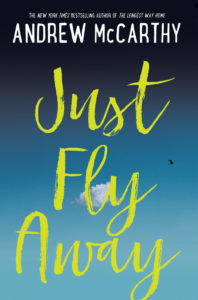 This week’s edition of “What’s Up in YA?” is sponsored by Just Fly Away by Andrew McCarthy.
This week’s edition of “What’s Up in YA?” is sponsored by Just Fly Away by Andrew McCarthy.
A debut novel about family secrets, first love, forgiveness, and finding one’s way in the world from award-winning writer, actor, and director Andrew McCarthy. When fifteen-year-old Lucy Willows discovers that her father has a child from a brief affair, she begins to question everything she thinks she knows about her life. Worse, Lucy’s father’s secret is now her own, one that isolates her from her friends, family—even her boyfriend, Simon. When Lucy runs away to Maine to visit her mysteriously estranged grandfather, she finally begins to get to the bottom of her family’s secrets and lies.
____________________
First, a big thank you goes out to Karina Glaser for covering last week’s edition of the “What’s Up in YA?” newsletter with an array of excellent crossover middle grade novels that YA readers would love. I know my TBR got a little bit longer — I keep wanting to read more middle grade, and I’m so glad to have some great entry points.
You may or may not be aware that April is Sexual Assault Awareness Month, a topic that’s near and dear to my heart. I try to approach it every year to not just highlight the YA books out there that explore the aspects of sexual assault and rape (and the cultures surrounding each) but to also go a little bit deeper, highlighting the real and true first-person experiences of these issues. Last year, I pulled together a rich reading list for this newsletter, but this year, I decided it was time to talk with a writer who recently released her debut novel that tackles sexual assault, among many other tough topics.
Kate Hart has been someone I’ve long admired in the YA world. Aside from being a novelist, she’s been part of the long-running blog YA Highway, and she’s take on numerous awesome side projects highlighting the achievements and accomplishments of women, including Badass Ladies You Should Know. Her first novel, After The Fall, hit shelves in January this year and it’s one I had the honor of reading during her revisited revision process (see below). It’s remained one in the forefront of my mind in the years since, and it’s one I hope is on the radar of YA readers because it packs a punch.
I’ve invited Kate to talk about her book, about some of her side projects, about how she’s teaching her sons about consent, and about the books she’s loved and those she’s looking forward to. I’m telling you now: grab your to-read list because it’s going to get longer.
Without further ado, here’s Kate Hart.
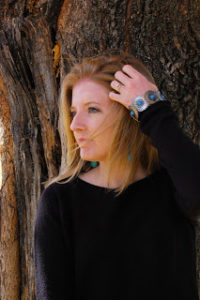 After studying Spanish and history at a small liberal arts school, Kate Hart taught young people their ABCs, wrote grants for grownups with disabilities, and now builds treehouses for people of all ages. Her debut YA novel, AFTER THE FALL, was published January 2017 by Farrar, Straus & Giroux. She also contributes to YA Highway, hosts the Badass Ladies You Should Know series, and sells jewelry, woodworking, and inappropriate embroidery at The Badasserie. A citizen of the Chickasaw Nation, she lives with her family in Northwest Arkansas.
After studying Spanish and history at a small liberal arts school, Kate Hart taught young people their ABCs, wrote grants for grownups with disabilities, and now builds treehouses for people of all ages. Her debut YA novel, AFTER THE FALL, was published January 2017 by Farrar, Straus & Giroux. She also contributes to YA Highway, hosts the Badass Ladies You Should Know series, and sells jewelry, woodworking, and inappropriate embroidery at The Badasserie. A citizen of the Chickasaw Nation, she lives with her family in Northwest Arkansas.
(Ed note: bold are my questions, unbold are Kate’s answers.)
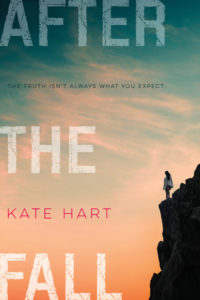 First: give us the pitch for AFTER THE FALL.
First: give us the pitch for AFTER THE FALL.
AFTER THE FALL is about Raychel, a low income girl in a college town, and the ripple effect that sexual assault has on her life. Her best friend Matt wants to help but keeps making things worse, and their friendship is put to the test when his mistaken beliefs about her life lead to a tragic accident.
Tell us a little about when you began writing and your journey from aspiring to published YA author.
I wrote a lot of poetry in high school, but turned to history in college and didn’t start writing fiction until I was 29. My first novel was the ubiquitous Twilight knock off, and when I realized it wasn’t going to get me an agent, I made a list of things I actually wanted to write about. “Hiking,” “feminism,” and “the Ozarks” got me reminiscing about high school, and remembering a particularly embarrassing rock climbing trip, I wrote the first line of a new project: “It’s entirely possible Matt can see up my shorts.” It’s still the first line of AFTER THE FALL.
It was a long process to get published, though. I wrote that line in April of 2010, and by July the manuscript had seven agent offers. But it took another seven years for the book to hit shelves. The original version got a lot of revision suggestions but no offers; I went on to write a different book that didn’t sell, then came back to AFTER THE FALL in 2014 for a major rewrite. It got an offer that summer, but the publishing process was rough — my first agent left the business, and I ended up with three different editors, which consequently moved my release date back a year. Now that it’s finally published, I’ve been at a sort of loss, trying to figure out how to write any other book.
![]() You are a girl of projects, and one of the long-running ones that many YA readers may be familiar with is YA Highway. Can you talk a little bit about how YA Highway started, what it looks like now, and what your role has been throughout?
You are a girl of projects, and one of the long-running ones that many YA readers may be familiar with is YA Highway. Can you talk a little bit about how YA Highway started, what it looks like now, and what your role has been throughout?
YA Highway started in May 2009, when five aspiring writers (Kirsten Hubbard, Kristin Halbrook, Kaitlin Ward, Michelle Schusterman, and Amanda Hannah) met on the Absolute Write boards and decided to blog about their publishing journeys. They eventually added 13 more members, including me in 2010, and my job was Field Trip Friday, a weekly roundup of writing tips, publishing news, and whatever funny things I’d seen that week. I wrote the feature for five years, and it really kept me going when the rest of my publishing career seemed impossible. I also redesigned the site a few times and created the Publishing Road Map resource.
Being part of YA Highway taught me a lot about working with a group, managing expectations, and dealing with public perception. Watching other members’ publishing paths meant I had no false illusions going into my own career. The staff became some of my very best friends, and we met a lot of other people in the YA community and helped them connect with each other, which felt like worthwhile work (and it’s how you and I met!)
But we were all just volunteers — no one at YA Highway has ever gotten paid, and we’ve always footed the bill for all costs ourselves. For a long time it was worth it just to be a resource to the community, but as each contributor progressed in her career, there came a point when time management meant backing away from the site’s huge demands. It wound down from multiple posts per week to a few recurring features, and today it’s basically just an archive of resources with the occasional news announcement. For now we’re still signal boosting on social media, especially Twitter and Tumblr, but when Sarah Enni and I get too busy for those duties, the site will probably close officially. I’m sad to see it go and still have a lot of ideas for it that I’d love to explore, but sometimes you have to make hard choices, and for now that means letting YA Highway go.
In addition to blogging about YA and writing your own YA, you host a series of interviews with rad women called Badass Ladies You Should Know. Can you tell us a bit about what inspired this project and what have been some of your proudest interviews and moments from it?
As the conversations about diversity in YA started coming to the forefront, and the community was beginning to grapple with the idea of signal boosting vs talking over people, I made a mistake and tried to publicly defend a friend of color when she was perfectly capable of doing it herself. She was very understanding, but it made me realize that my hot takes on those topics are very rarely needed. But I did have a growing platform to share, as well as a desire to reach outside of YA, which even then felt like an echo chamber. Giving a spotlight to inspiring women seemed like a useful contribution that accomplished both in a positive manner.
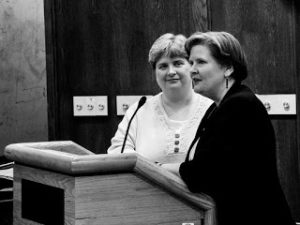 Everyone I’ve profiled has of course been amazing in some way, but the first interview to make me cry was with Sharon Bishop-Baldwin and Mary Baldwin-Bishop, newspaper editors and plaintiffs in the case that brought marriage equality to Oklahoma. Their dedication to their cause, and to each other, is so inspiring and encouraging. I also loved the interview with Fayette Mong, a lawyer and old friend from high school, whose honesty about growing up Chinese in Arkansas and the challenges she faces on the job in Boston just blew me away. More recently, I loved sharing an interview Jen Baquial, the president of Sirens Motorcycle Club of NYT, which leads the pride parade and delivers donor breastmilk in its spare time, and an interview with literary agent Saba Sulaiman, who gave stellar advice on supporting other women.
Everyone I’ve profiled has of course been amazing in some way, but the first interview to make me cry was with Sharon Bishop-Baldwin and Mary Baldwin-Bishop, newspaper editors and plaintiffs in the case that brought marriage equality to Oklahoma. Their dedication to their cause, and to each other, is so inspiring and encouraging. I also loved the interview with Fayette Mong, a lawyer and old friend from high school, whose honesty about growing up Chinese in Arkansas and the challenges she faces on the job in Boston just blew me away. More recently, I loved sharing an interview Jen Baquial, the president of Sirens Motorcycle Club of NYT, which leads the pride parade and delivers donor breastmilk in its spare time, and an interview with literary agent Saba Sulaiman, who gave stellar advice on supporting other women.
This is your debut year. What has the experience been like for you as a newly-published author? Has being close to others who’ve been published via your own work in the YA world made it more or less intimidating?
I came into the debut experience feeling like an old crone. It’s a right of passage to freak out about things like Goodreads ratings, and here I was like “you should have seen the YA Mafia kerfuffle of 2011, you kids get off my lawn.” Avoiding those issues was a plus, but I’d already watched so many careers from behind the scenes that I felt very wizened and cynical about a lot of things that should have been exciting.
But of course I didn’t and couldn’t know everything, and some things still took me off guard. I never really had an “omg it’s a book” moment where I burst into tears or it all became capital R Real, but seeing my cover comp for the first time and immediately loving was made more amazing because I knew how many authors get covers they don’t like. And the fact that so many published author friends came together to fundraise for RAINN on my release day was a humbling and moving experience for which I’ll always be grateful.
AFTER THE FALL is a story about survival. More specifically, it’s a story about surviving sexual assault. What made you want to write about it?
To be honest, I never intended to write about sexual assault. I was just exploring my teenage feelings of inadequacy and having tried to keep up with my guy friends, both academically and on the trail. But it soon became obvious that I couldn’t address those issues without also addressing my own assault in high school, and how that affected my self esteem, my desire to prove myself, and the ways I treated myself and those around me. So I gave that backstory to Raychel and then explored how it would affect or change the story I’d already sketched out.
What draws you to telling stories like this one, especially from the perspective of a girl who is imperfect, who makes unpopular choices, and has tough consequences with which to wrestle?
Teenage girls are so demonized in our society. I didn’t realize how complicit I was in those judgments until I started reading YA and found myself reevaluating things I’d always believed about my own teenage years. I know this is where I’m supposed to say, “I write for those girls to see themselves on the page,” but the truth is that I just try to write honestly *about* those girls, not for them. I try to realistically portray what teenage girls deal with, and how ridiculous and unfair their communities’ expectations are. Teenage girls do need to see themselves in stories, so that they know they’re not alone, but others need to see these narratives just as much, so they can stop alienating those girls.
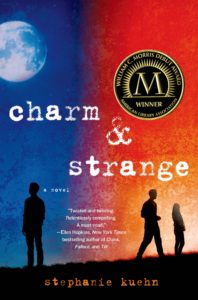 Since April is Sexual Assault Awareness Month, care to share some of your must-read YA titles that take on the issue of sexual assault/rape/abuse and why those titles stand out to you?
Since April is Sexual Assault Awareness Month, care to share some of your must-read YA titles that take on the issue of sexual assault/rape/abuse and why those titles stand out to you?
While I was writing AFTER THE FALL, I tried to avoid books with similar topics, but Laurie Halse Anderson’s Speak, Sara Zarr’s Story of a Girl, and Courtney Summers’s Cracked Up To Be made me realize early on that these topics could be tackled in YA. Later, Courtney’s All the Rage made me pace around my house for half an hour after I finished it. I also thought Stephanie Kuehn’s Charm and Strange was a very nuanced take on abuse; Brandy Colbert’s Pointe fearlessly tackled some tough topics, and I liked how Where The Stars Still Shine by Trish Doller gave sexual agency back to the main character.
Going a little further, and perhaps a bit more personal, you have two young sons. What sorts of books and discussions do you plan on having with them about sexual assault, rape, and consent when they’re ready for them?
We’ve been talking about basic concepts of consent since they were born. “Keep your hands to yourself” is an important lesson from… well, not day one, but at least the day you realize you’re the one controlling your hands. Simple things like “that girl asked you not to hug her so don’t” are a chance to lay the groundwork. Certain family members have tried the “boys will be boys” excuse for misbehavior, and we’ve made clear that, as the Tumblr post says, boys will be held accountable for their actions like everyone else.
My kids are now 9 and 11, and we’re very honest with them. As high profile trials hit the news, and celebrities and politicians and entire sports teams are exposed as abusers, we may not go into details but we definitely make sure they understand what happened and why it’s wrong. At the moment they self-censor and don’t want to read anything sex-related, but they’re allowed to read anything they want and I’ll certainly be putting important titles like the ones above on their shelves.
What kinds of books were you reading as a teenager? What book or books available now do you wish you could hand your younger self?
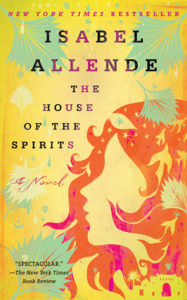 Much to my mother’s horror, my grandma handed me Clan of the Cave Bear by Jean Auel when I was in fourth grade, and I was obsessed with that series for years — I was the weird kid banging gravel together in the backyard, pretending to flint knap like Ayla. As an actual teen, I also loved Stephen King’s The Stand, Anne Rice’s The Feast of All Saints, Watchers by Dean Koontz, Lonesome Dove by Larry McMurtry, The House of the Spirits by Isabel Allende, and A Gift Upon The Shore by M. K. Wren (which I picked up at Walmart based solely on the Jean Auel blurb). Later in high school I was also really affected by Margaret Atwood’s The Handmaid’s Tale, which made its way into AFTER THE FALL.
Much to my mother’s horror, my grandma handed me Clan of the Cave Bear by Jean Auel when I was in fourth grade, and I was obsessed with that series for years — I was the weird kid banging gravel together in the backyard, pretending to flint knap like Ayla. As an actual teen, I also loved Stephen King’s The Stand, Anne Rice’s The Feast of All Saints, Watchers by Dean Koontz, Lonesome Dove by Larry McMurtry, The House of the Spirits by Isabel Allende, and A Gift Upon The Shore by M. K. Wren (which I picked up at Walmart based solely on the Jean Auel blurb). Later in high school I was also really affected by Margaret Atwood’s The Handmaid’s Tale, which made its way into AFTER THE FALL.
I think younger me would have benefited from the rape culture books listed above, but I would also feed my teenage love for salty ladies written in lyrical language. I would have adored Laini Taylor’s Lips Touch Three Times, the Metamorphoses series by Sarah McCarry, Nova Ren Suma’s The Walls Around Us, Silvia Moreno-Garcia’s Certain Dark Things, Bone Gap by Laura Ruby, Everything Leads to You by Nina LaCour, The Sleepwalker’s Guide to Dancing by Mira Jacob, The Fever by Megan Abbott, or White Is For Witching by Helen Oyeyemi. Poetry-wise, I’d love to hand teenage-me Poisoned Apples by Christine Heppermann, Spiral Bound by Dessa, or When My Brother Was an Aztec by Natalie Diaz. (Luckily I have four nieces that I can inundate with books instead.)
Who is your ideal reader? Who would you want to bump into in public reading your book or reading one of your Badass Ladies interviews?
I’m still new enough to this part of the game that meeting anyone who was affected by the book is a treat. While I’m writing, however, my ideal reader is always my best friend Catherine, who started critiquing my poetry when we were twelve and still beta reads for me twenty-something years later.
As for Badass Ladies, I would love to bump into an editor who wants to make it a book project. Unfortunately I do not often wander the streets of New York but hope springs eternal…
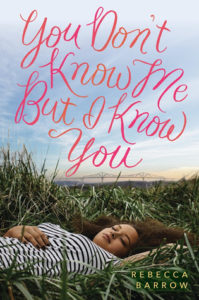 Let’s wrap this up by looking ahead! What books are you most looking forward to reading soon?
Let’s wrap this up by looking ahead! What books are you most looking forward to reading soon?
I’ve found reading really challenging for the last few months because it’s felt like work, but the further I get from release day, the more it sounds appealing again. I’m very much looking forward to Maurene Goo’s I Believe In a Thing Called Love, Laini Taylor’s Strange the Dreamer, Somaiya Daud’s Mirage, Lilliam Rivera’s The Education of Margot Sanchez, Sarah Nicole Lemon’s Done Dirt Cheap, Little and Lion by Brandy Colbert, American Street by Ibi Zoboi, Zan Romanoff’s Grace and the Fever, and You Don’t Know Me But I Know You by Rebecca Barrow.
____________________
A big thank you to Kate Hart for stopping by to talk.
Stay reading, YA fans, and we’ll see you again next Monday with a look at some of the latest YA news.
–Kelly Jensen, @veronikellymars